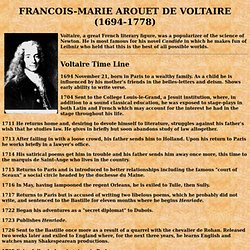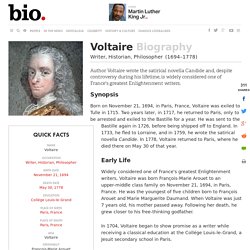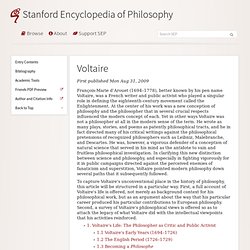

Voltaire. Enlightenment From Voltaire Voltaire's Deism "It is then apparent that, if there are great crimes on the earth, there are as many virtues; and that, if superstition produces horrible sufferings, philosophy redresses them.

" "We hold the Jews in horror, and we insist that all which has been written by them, and collected by us, bears the stamp of Divinity. There never was so palpable a contradiction. " "Let each of us boldly and honestly say: How little it is that I really know! " "What is faith? "The most beautiful of all emblems is that of God, whom Timaeus of Locris describes under the image of 'A circle whose center is everywhere and circumference nowhere.'" "An almost infallible means of saving yourself from the desire of self-destruction is always to have something to do. " "A good action is preferable to an argument. " "Our wretched species is so made that those who walk on the well-trodden path always throw stones at those who are opening a new road. " Voltaire. Voltaire, a great French literary figure, was a popularizer of the science of Newton.

He is most famous for his novel Candide in which he makes fun of Leibniz who held that this is the best of all possible worlds. 1694 November 21, born in Paris to a wealthy family. As a child he is influenced by his mother's friends in the belles-letters and deism. Shows early ability to write verse. 1704 Sent to the College Louis-le-Grand, a Jesuit institution, where, in addition to a sound classical education, he was exposed to stage-plays in both Latin and French which may account for the interest he had in the stage throughout his life. 1711 He returns home and, desiring to devote himself to literature, struggles against his father's wish that he studies law. 1713 After falling in with a loose crowd, his father sends him to Holland. 1714 His satirical poems get him in trouble and his father sends him away once more, this time to the marquis de Saint-Ange who lives in the country.
Internet Resources. Francois-Marie Arouet Voltaire. Voltaire Biography. Author Voltaire wrote the satirical novella Candide and, despite controversy during his lifetime, is widely considered one of France's greatest Enlightenment writers.

Synopsis Born on November 21, 1694, in Paris, France, Voltaire was exiled to Tulle in 1715. Two years later, in 1717, he returned to Paris, only to be arrested and exiled to the Bastille for a year. He was sent to the Bastille again in 1726, before being shipped off to England. In 1733, he fled to Lorraine, and in 1759, he wrote the satirical novella Candide. Early Life Widely considered one of France's greatest Enlightenment writers, Voltaire was born François-Marie Arouet to an upper-middle class family on November 21, 1694, in Paris, France. In 1704, Voltaire began to show promise as a writer while receiving a classical education at the Collége Louis-le-Grand, a Jesuit secondary school in Paris. Major Works Voltaire's major fall into four categories: poetry, plays, historical works and philosophical works. Death. SEP on Voltaire.
First published Mon Aug 31, 2009 François-Marie d'Arouet (1694–1778), better known by his pen name Voltaire, was a French writer and public activist who played a singular role in defining the eighteenth-century movement called the Enlightenment.

At the center of his work was a new conception of philosophy and the philosopher that in several crucial respects influenced the modern concept of each. Yet in other ways Voltaire was not a philosopher at all in the modern sense of the term. He wrote as many plays, stories, and poems as patently philosophical tracts, and he in fact directed many of his critical writings against the philosophical pretensions of recognized philosophers such as Leibniz, Malebranche, and Descartes.
He was, however, a vigorous defender of a conception of natural science that served in his mind as the antidote to vain and fruitless philosophical investigation. 1. Voltaire only began to identify himself with philosophy and the philosophe identity during middle age.